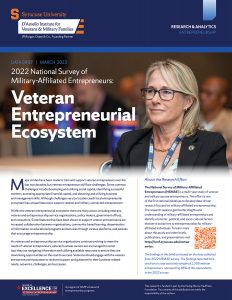Major strides have been made to train and support veteran entrepreneurs over the last two decades, but veteran entrepreneurs still face challenges. Some common challenges include developing and utilizing social capital, identifying successful mentors, accessing appropriate financial capital, and obtaining and utilizing business and management skills. Although challenges vary by location, each local entrepreneurial ecosystem has unique features to support veteran and military connected entrepreneurs.
Within the veteran entrepreneurial ecosystem there are many actors including veterans, veteran and entrepreneurship service organizations, policy makers, government offices, and consumers. However, the veteran entrepreneurship resource landscape can be fragmented and siloed. Many veteran entrepreneurs reported experiencing the most help through SBA resources and college or university academic programs, but over 46 percent of veteran entrepreneurs indicated that navigating the resources in their local community was not easy. Research also indicates that veteran entrepreneurs experience an array of barriers that include (but not limited to) access to capital, difficulty navigating resources, lack of network and mentors, and certification process hurdles. Success or failure does not depend on one, but rather on multiple factors related to barriers and challenges veteran entrepreneurs experience while also navigating the complex and disintegrated veteran entrepreneurship ecosystem. These navigational challenges can lead to a lack of knowledge and access to local resources as well as feeling unsupported by both government and local communities. Some features that have been shown to support veteran entrepreneurs are increased collaboration between organizations, community-based learning, dissemination of information on educational programs and services through various platforms, and policies that encourage entrepreneurship.
As veteran and entrepreneurship service organizations continue evolving to meet the needs of veteran entrepreneurs, veteran business owners are encouraged to revisit how they are navigating information and utilizing available resources to ensure they are maximizing opportunities on the road to success. Veterans should engage with the veteran entrepreneurial ecosystem to received support and guidance for their business-related needs, networks, challenges, and successes
The findings in this brief are based on the data collected from 2022 NSMAE survey. The findings reported here are from a cross-sectional sample of 1,358 veteran entrepreneurs.
To learn more about this study and other briefs, publications, and presentations visit The NSMAE Series.
A Few Key Takeaways
80% consider themselves to be a successful business owner/entrepreneur
In 2021, businesses were:
Barriers to Entrepreneurship
Below we highlight some key challenges. Veteran entrepreneurs encounter a variety of challenges such as capital, mentorships, and networks. Barriers and challenges are not always exclusive, but these are the most common hurdles.

